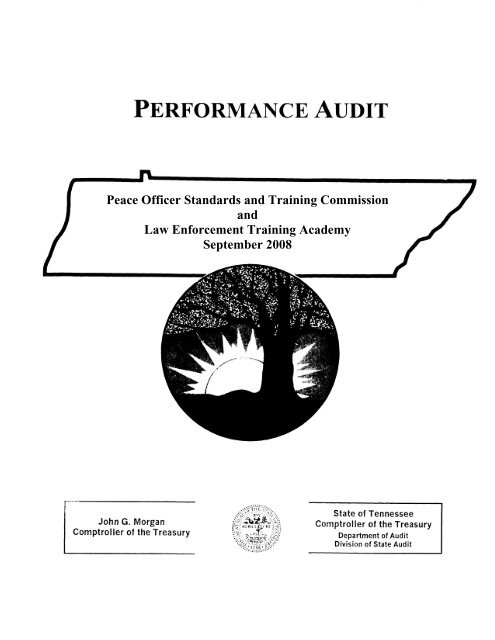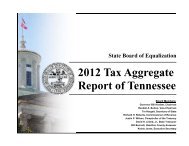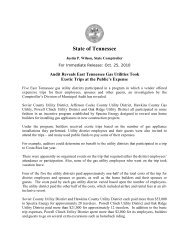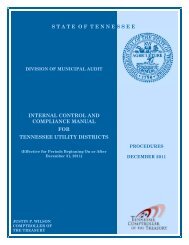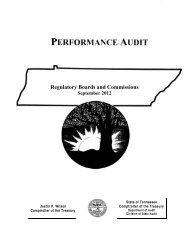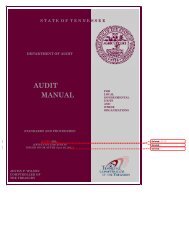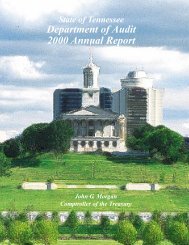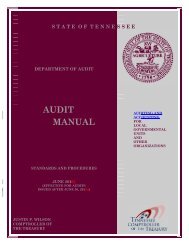Peace Officer Standards and Training Commission and Law ...
Peace Officer Standards and Training Commission and Law ...
Peace Officer Standards and Training Commission and Law ...
- No tags were found...
Create successful ePaper yourself
Turn your PDF publications into a flip-book with our unique Google optimized e-Paper software.
<strong>Peace</strong> <strong>Officer</strong> <strong>St<strong>and</strong>ards</strong> <strong>and</strong> <strong>Training</strong> <strong>Commission</strong><strong>and</strong><strong>Law</strong> Enforcement <strong>Training</strong> AcademySeptember 2008
Arthur A. Hayes, Jr., CPA, JD, CFEDirectorDeborah V. Loveless, CPA, CGFMAssistant DirectorDiana Jones, CGFMAudit ManagerTom S<strong>and</strong>ersIn-Charge AuditorAngela HubbardStaff AuditorAmy BrackEditorComptroller of the Treasury, Division of State Audit1500 James K. Polk Building, Nashville, TN 37243-0264(615) 401-7897Performance audits are available on-line at www.comptroller.state.tn.us/sa/reports/index.html.For more information about the Comptroller of the Treasury, please visit our website atwww.comptroller.state.tn.us.
John G. MorganComptrollerSTATE OF TENNESSEECOMPTROLLER OF THE TREASURYState CapitolNashville, Tennessee 37243-0260(615) 741-2501September 30, 2008The Honorable Ron RamseySpeaker of the SenateThe Honorable Jimmy NaifehSpeaker of the House of RepresentativesThe Honorable Thelma M. Harper, ChairSenate Committee on Government OperationsThe Honorable Mike Kernell, ChairHouse Committee on Government Operations<strong>and</strong>Members of the General AssemblyState CapitolNashville, Tennessee 37243Ladies <strong>and</strong> Gentlemen:Transmitted herewith is the performance audit of the <strong>Peace</strong> <strong>Officer</strong> <strong>St<strong>and</strong>ards</strong> <strong>and</strong><strong>Training</strong> <strong>Commission</strong> <strong>and</strong> the <strong>Law</strong> Enforcement <strong>Training</strong> Academy. This audit was conductedpursuant to the requirements of Section 4-29-111, Tennessee Code Annotated, the TennesseeGovernmental Entity Review <strong>Law</strong>.This report is intended to aid the Joint Government Operations Committee in its review todetermine whether the commission should be continued, restructured, or terminated.Sincerely,JGM/dlj07-016John G. MorganComptroller of the Treasury
State of TennesseeA u d i t H i g h l i g h t sComptroller of the TreasuryDivision of State AuditPerformance Audit<strong>Peace</strong> <strong>Officer</strong> <strong>St<strong>and</strong>ards</strong> <strong>and</strong> <strong>Training</strong> <strong>Commission</strong><strong>and</strong><strong>Law</strong> Enforcement <strong>Training</strong> AcademySeptember 2008_________AUDIT OBJECTIVESThe objectives of the audit were (1) to determine if the <strong>Law</strong> Enforcement <strong>Training</strong> Academy(LETA) conducts periodic assessments of training fees charged to students, <strong>and</strong> adjusts fees whennecessary; (2) to determine the need for non-LETA training academies in Tennessee <strong>and</strong> if efforts tomonitor non-LETA academies are adequate; (3) to assess the use of officers in the state who are notcertified by the <strong>Peace</strong> <strong>Officer</strong> <strong>St<strong>and</strong>ards</strong> <strong>and</strong> <strong>Training</strong> (POST) <strong>Commission</strong> <strong>and</strong> the potential effects ofsuch use; (4) to assess the role <strong>and</strong> training of constables in Tennessee; (5) to assess the adequacy of thePOST <strong>Commission</strong>’s/LETA’s data management system; (6) to assess the POST <strong>Commission</strong>’s policies<strong>and</strong> procedures for processing income supplement requests from local law enforcement agencies; (7) todetermine if vacancies on the POST <strong>Commission</strong> are filled timely <strong>and</strong> what requirements existregarding meeting attendance; (8) to summarize Title VI-related information for the POST <strong>Commission</strong><strong>and</strong> LETA; <strong>and</strong> (9) to recommend possible alternatives for legislative or administrative action that mayresult in more efficient <strong>and</strong> effective operation of the POST <strong>Commission</strong> <strong>and</strong> LETA.FINDINGSThe POST <strong>Commission</strong>’s Monitoring of theNon-LETA <strong>Training</strong> Academies Has BeenInadequate But Is ImprovingIn addition to the <strong>Law</strong> Enforcement <strong>Training</strong>Academy in Nashville, the POST <strong>Commission</strong>is responsible for oversight of the ten POSTapprovedacademies across the state. Anauditor review of POST files, however, foundthat all agencies are not submitting annualreports, nor has the POST <strong>Commission</strong>conducted all on-site reviews. (The on-sitereviews that had been performed appeared to bethorough in nature.) Failure to obtain suchinformation <strong>and</strong> conduct such reviews limitsthe POST <strong>Commission</strong>’s ability to ensure theacademies are in compliance with POST<strong>Commission</strong> guidelines, <strong>and</strong> thus, are training<strong>and</strong> graduating qualified officers. As a resultof legislation that placed the TennesseeHighway Patrol under POST, effective July 1,2006, the POST <strong>Commission</strong> receivedauthorization to hire three investigators (whonow perform the on-site reviews), along withtwo administrative secretaries <strong>and</strong> oneadministrative services assistant position.The first investigator position was filled in
December 2006, <strong>and</strong> by February 2007, allthree positions had been filled. According tomanagement, the POST <strong>Commission</strong>’s goal willbe to periodically audit all academies, but howoften had not yet been determined (page 4).POST <strong>Commission</strong> Staff Do Not Have theCapability to Maintain <strong>and</strong> Monitor DataElectronicallyAll files <strong>and</strong> records of officers certified by thePOST <strong>Commission</strong> are maintained in a paperfiling system. The POST <strong>Commission</strong> does nothave a system in which records can bemaintained <strong>and</strong> monitored electronically. As aresult, staff’s (<strong>and</strong> external auditors’) ability tolocate records <strong>and</strong> track data is impaired. Noneof the data we evaluated were availableelectronically, <strong>and</strong> auditors had to manuallysearch through files in the agency’s file room.While files are in alphabetical order, there areapproximately 39,000 files, some with multiplelistings <strong>and</strong> some for officers who are no longercertified or are deceased. Implementation of anelectronic data system would increase the Post<strong>Commission</strong>’s/LETA’s ability to record <strong>and</strong>track data <strong>and</strong> allow staff to process requests(e.g., information requests from officers or lawenforcement agencies) more efficiently <strong>and</strong>timely. Furthermore, a data system withappropriate step edits (controls) would result inmore accurate information (page 6).The POST <strong>Commission</strong> Does Not Have aPolicy Requiring Meeting AttendanceThe POST <strong>Commission</strong> serves as the primaryregulatory body for Tennessee lawenforcement. Among its statutory duties, thecommission is charged with developing,planning, <strong>and</strong> implementing law enforcementtraining programs for all local lawenforcement officers in Tennessee <strong>and</strong>establishing uniform st<strong>and</strong>ards for theemployment <strong>and</strong> training of police officers.Despite this duty of public service, thecommission does not have a minimumm<strong>and</strong>atory attendance requirement to ensurethe presence of commission members atmeetings. A review of meeting minutes forfiscal years ending June 30, 2005, 2006, <strong>and</strong>2007 revealed that some commissionmembers did not attend meetings on a regularbasis. Poor attendance may affect thecommission’s ability to conduct business. Itreduces the number of members available fora quorum <strong>and</strong> representation of interestsspecified by law. For the years under review,at least two meetings were conducted withouta quorum (a minimum of nine votingmembers). For two additional meetings,auditors could not determine if a quorum waspresent because not all members were listedas either “present” or “absent” (page 8).OBSERVATIONS AND COMMENTSThe audit also discusses the following issues: the need for non-LETA training academies; formalpolicies implemented by the POST <strong>Commission</strong> that address concerns regarding the processing ofincome supplement requests; the adequacy of training fees; uncertified officers; constables inTennessee; <strong>and</strong> the monitoring of local law enforcement agencies (page 9).
Performance Audit<strong>Peace</strong> <strong>Officer</strong> <strong>St<strong>and</strong>ards</strong> <strong>and</strong> <strong>Training</strong> <strong>Commission</strong><strong>and</strong>Tennessee <strong>Law</strong> Enforcement <strong>Training</strong> AcademyTABLE OF CONTENTSINTRODUCTION 1Purpose <strong>and</strong> Authority for the Audit 1Objectives of the Audit 1Scope <strong>and</strong> Methodology of the Audit 2History, Statutory Responsibilities, <strong>and</strong> Organization 2FINDINGS AND RECOMMENDATIONS 41. The POST <strong>Commission</strong>’s monitoring of the non-LETA training academies has beeninadequate but is improving 42. POST <strong>Commission</strong> staff do not have the capability to maintain <strong>and</strong> monitor dataelectronically 63. The POST <strong>Commission</strong> does not have a policy requiring meeting attendance 8OBSERVATIONS AND COMMENTS 9Need for Non-LETA <strong>Training</strong> Academies 9The POST <strong>Commission</strong> Has Implemented Formal Policies for Processing Income SupplementRequests, Addressing Concerns Initially Identified by Auditors 11Adequacy of <strong>Training</strong> Fees 14Uncertified <strong>Officer</strong>s 14Constables in Tennessee 17Monitoring Local <strong>Law</strong> Enforcement Agencies 19RECOMMENDATIONS 20Administrative 20APPENDIX 21Title VI Information 21Page
Performance Audit<strong>Peace</strong> <strong>Officer</strong> <strong>St<strong>and</strong>ards</strong> <strong>and</strong> <strong>Training</strong> <strong>Commission</strong><strong>and</strong><strong>Law</strong> Enforcement <strong>Training</strong> AcademyINTRODUCTIONPURPOSE AND AUTHORITY FOR THE AUDITThis performance audit of the <strong>Peace</strong> <strong>Officer</strong> <strong>St<strong>and</strong>ards</strong> <strong>and</strong> <strong>Training</strong> (POST) <strong>Commission</strong><strong>and</strong> the <strong>Law</strong> Enforcement <strong>Training</strong> Academy (LETA) was conducted pursuant to the TennesseeGovernmental Entity Review <strong>Law</strong>, Tennessee Code Annotated, Title 4, Chapter 29. UnderSection 4-29-229, the <strong>Peace</strong> <strong>Officer</strong> <strong>St<strong>and</strong>ards</strong> <strong>and</strong> <strong>Training</strong> <strong>Commission</strong> was scheduled toterminate June 30, 2008, <strong>and</strong> is currently in wind-down, pending legislative action. TheComptroller of the Treasury is authorized under Section 4-29-111 to conduct a limited programreview audit of the commission <strong>and</strong> to report to the Joint Government Operations Committee ofthe General Assembly. The audit is intended to aid the committee in determining whether thecommission should be continued, restructured, or terminated. (The <strong>Law</strong> Enforcement <strong>Training</strong>Academy is not listed separately under the Governmental Entity Review <strong>Law</strong>. It was included inthe 1997 <strong>and</strong> 2004 performance audits of the Department of Safety. Because of the academy’sclose relationship with the POST <strong>Commission</strong> <strong>and</strong> its recent transfer to the Department ofCommerce <strong>and</strong> Insurance, LETA was included in this audit.)OBJECTIVES OF THE AUDITThe objectives of the audit were1. to determine if the <strong>Law</strong> Enforcement <strong>Training</strong> Academy (LETA) conducts periodicassessments of training fees charged to students <strong>and</strong> adjusts fees when necessary;2. to determine the need for non-LETA training academies in Tennessee <strong>and</strong> if efforts tomonitor non-LETA academies are adequate;3. to assess the use of officers in the state who are not certified by the <strong>Peace</strong> <strong>Officer</strong><strong>St<strong>and</strong>ards</strong> <strong>and</strong> <strong>Training</strong> (POST) <strong>Commission</strong> <strong>and</strong> the potential effects of such use;4. to assess the role <strong>and</strong> training of constables in Tennessee;5. to assess the adequacy of the POST <strong>Commission</strong>’s/LETA’s data management system;6. to assess the POST <strong>Commission</strong>’s policies <strong>and</strong> procedures for processing incomesupplement requests from local law enforcement agencies;1
7. to determine if vacancies on the POST <strong>Commission</strong> are filled timely <strong>and</strong> whatrequirements exist regarding meeting attendance;8. to summarize Title VI-related information for the POST <strong>Commission</strong> <strong>and</strong> LETA; <strong>and</strong>9. to recommend possible alternatives for legislative or administrative action that mayresult in more efficient <strong>and</strong> effective operation of the POST <strong>Commission</strong> <strong>and</strong> LETA.SCOPE AND METHODOLOGY OF THE AUDITThe activities of the <strong>Peace</strong> <strong>Officer</strong> <strong>St<strong>and</strong>ards</strong> <strong>and</strong> <strong>Training</strong> (POST) <strong>Commission</strong> <strong>and</strong> the<strong>Law</strong> Enforcement <strong>Training</strong> Academy (LETA) were reviewed for the fiscal years 2005 through2007. The audit was conducted in accordance with the st<strong>and</strong>ards applicable to performanceaudits contained in Government Auditing <strong>St<strong>and</strong>ards</strong> issued by the Comptroller General of theUnited States <strong>and</strong> included1. review of applicable legislation, <strong>and</strong> POST <strong>Commission</strong>/LETA policies <strong>and</strong>procedures;2. examination of POST <strong>Commission</strong>/LETA records, reports, <strong>and</strong> meeting minutes;3. examination of prior performance audit <strong>and</strong> financial <strong>and</strong> compliance audit reports onthe POST <strong>Commission</strong>/LETA, as well as such reports from other states;4. interviews with commission <strong>and</strong> academy staff <strong>and</strong> staff of other state agencies thatinteract with the commission <strong>and</strong> academy; <strong>and</strong>5. interviews with advocacy groups that interact with the POST <strong>Commission</strong> <strong>and</strong> LETA.HISTORY, STATUTORY RESPONSIBILITIES, AND ORGANIZATIONThe Tennessee <strong>Law</strong> Enforcement <strong>Training</strong> Academy (LETA) was created in 1966 withthe mission to train state <strong>and</strong> local law enforcement officers. Prior to this date, the only trainingwas for officers in larger cities. Situated in Nashville, the academy operates five ten-weektraining classes annually, training 400-600 officer c<strong>and</strong>idates, depending on hiring needs. Inaddition, the academy is also open to students pursuing a degree with a major in law enforcementor police science in a college or university in Tennessee. Approximately 55 percent of theacademy’s students are attending their initial law enforcement training. In addition to the LETAacademy, LETA also provides oversight of ten academies across the state approved by the <strong>Peace</strong><strong>Officer</strong> <strong>St<strong>and</strong>ards</strong> <strong>and</strong> <strong>Training</strong> (POST) <strong>Commission</strong>.In 1977, with federal dollars provided as a means to establish law enforcement trainingst<strong>and</strong>ards nationwide, the <strong>Law</strong> Enforcement Planning Agency was established. This agency, apredecessor to the POST <strong>Commission</strong>, was later dissolved in 1980. The POST <strong>Commission</strong> wascreated in 1981 <strong>and</strong> became functional the following year. The POST <strong>Commission</strong>’s mission isto set minimum <strong>and</strong> ongoing training st<strong>and</strong>ards, <strong>and</strong> also pre-employment hiring st<strong>and</strong>ards,2
thereby enhancing professionalism in the training of officers at LETA <strong>and</strong> other academies inTennessee.Pursuant to Section 38-8-104, Tennessee Code Annotated, the commission’sresponsibilities include developing, planning, <strong>and</strong> implementing law enforcement trainingprograms for all local law enforcement officers in Tennessee; establishing uniform st<strong>and</strong>ards forthe employment <strong>and</strong> training of police officers, including pre-employment qualifications <strong>and</strong>requirements for officer certification; establishing minimum st<strong>and</strong>ards <strong>and</strong> curriculumrequirements for courses of study offered by or for any municipality, the state, or any politicalsubdivision thereof, for the specific purposes of training police recruits or police officers;consulting <strong>and</strong> cooperating with local jurisdictions <strong>and</strong> educational institutions with regard totraining; approving facilities used for training officers <strong>and</strong> recruits; issuing training certifications;<strong>and</strong> administering income supplements for police officers.From 1966 to 1983, LETA (POST/LETA as of 1981) acted as an independent agency.However, in 1983 by executive order, it was moved to the Department of Safety. In July 2006,LETA <strong>and</strong> the POST <strong>Commission</strong> were moved under the authority of the Department ofCommerce <strong>and</strong> Insurance. Historically, POST <strong>Commission</strong> st<strong>and</strong>ards <strong>and</strong> regulations haveapplied to local law enforcement officers <strong>and</strong> some state officers. As of July 1, 2006, however,POST <strong>Commission</strong> st<strong>and</strong>ards also apply to all newly hired Tennessee Highway Patrol officers,with existing officers to be gr<strong>and</strong>fathered in. Today, LETA <strong>and</strong> the POST <strong>Commission</strong> areresponsible for the training <strong>and</strong> regulation of 12,000 local officers <strong>and</strong> 2,500 state officers,including 900 Tennessee Highway Patrol officers. Exempt from POST <strong>Commission</strong>/LETArequirements are state park rangers, Department of Revenue officers, <strong>and</strong> Tennessee WildlifeResources Agency officers. However, according to LETA management, these agenciesgenerally will not hire officers unless they meet POST st<strong>and</strong>ards.By statute, the POST <strong>Commission</strong> is composed of 18 members: two police officersbelow the rank of assistant chief, or equivalent rank; the attorney general <strong>and</strong> reporter; twosheriffs <strong>and</strong> two municipal chiefs of police who are appointed by the Governor <strong>and</strong> serve at theGovernor’s pleasure; two non-supervisory police officers; one member of the senate <strong>and</strong> onemember of the house of representatives who are appointed by the respective speakers <strong>and</strong> whoare non-voting members of the commission to serve for terms of two years; three citizens whoare not connected with law enforcement—one to be appointed by resolution of the house ofrepresentatives, one appointed by resolution of the senate, <strong>and</strong> the third to be appointed by theGovernor; <strong>and</strong> four additional members to be appointed by the Governor.As of September 2007, the POST <strong>Commission</strong> had a staff of 6 employees, <strong>and</strong> LETA hada staff of 25. The director of LETA serves as the executive secretary of the POST <strong>Commission</strong>,<strong>and</strong> some LETA staff also provide services for the POST <strong>Commission</strong>. During fiscal year 2007,LETA had expenditures of $3,642,200, <strong>and</strong> the POST <strong>Commission</strong> had expenditures of$7,442,000. (Over 97% of the POST <strong>Commission</strong>’s expenditures were operational expenditures,primarily for salary supplements to police officers who complete the required annual training.)Estimated fiscal year 2008 expenditures were approximately $4 million for LETA <strong>and</strong> $8 millionfor the POST <strong>Commission</strong>.3
As of February 2008, POST had reviewed seven of the non-LETA academies. Audits ofthe Knoxville Police Department <strong>and</strong> the Knox County Sheriff’s Department were conducted inMay 2007. The Memphis Police Department, Shelby County Sheriff’s Department, <strong>and</strong> theMetro Nashville Police Department were reviewed in September through October 2007. Inaddition, a review of the THP academy was conducted in November 2006, for POSTcertificationas a basic training academy, <strong>and</strong> the Blount County Sheriff Department’s academywas reviewed in May 2007 for approval to establish a new academy. The on-site reviews foundthat all of the academies reviewed met or exceeded POST requirements. Three of the academieshad not been reviewed, <strong>and</strong> the POST <strong>Commission</strong>/LETA was unable to provide documentationof any on-site reviews conducted prior to late 2006.The on-site reviews performed appeared to be thorough in nature. For example, itemsreviewed included dates of training sessions <strong>and</strong> class schedules, lists of instructors <strong>and</strong> theirqualifications (training staff must include at least two full-time staff who are certified asAcademy Instructors), <strong>and</strong> verification that topics of instruction meet or exceed 400-hourminimum curricula requirements. The topics of instruction must include firearms, emergencymedical training, patrol procedures, interpersonal communications, professional <strong>and</strong> ethicalconduct, physical defense tactics, criminal <strong>and</strong> constitutional law <strong>and</strong> procedures, writtencommunications, human relations, criminal justice system, police stress, administration,emergency vehicle operation, <strong>and</strong> National Safety Council defensive driving. Otherrequirements address st<strong>and</strong>ards of buildings <strong>and</strong> facilities, firing range <strong>and</strong> police driving skillranges, record keeping, <strong>and</strong> control of environment (i.e., control of the student environment topromote efficient learning).According to its director, LETA would like to inspect the academies annually but in thepast has been unable to do so because of staff shortages. Prior to July 2006, LETA’s assistantdirector served as the only on-site reviewer, along with performing his usual management duties.Unless something noteworthy occurred at an academy that required an investigation, theacademies were not reviewed. However, as a result of legislation that placed THP under POST,effective July 1, 2006, the POST <strong>Commission</strong> received authorization to hire three investigators(who now perform the on-site reviews), along with two administrative secretaries <strong>and</strong> oneadministrative services assistant position. The first investigator position was filled in December2006, <strong>and</strong> by February 2007, all three positions had been filled. According to management, thePOST <strong>Commission</strong>’s goal will be to periodically audit all academies, but how often has not yetbeen determined.RecommendationThe POST <strong>Commission</strong> should require that all academies submit annual reports asrequired, <strong>and</strong> follow up the reports with routine on-site reviews to ensure all academies adhere toPOST <strong>Commission</strong> requirements.5
Management’s CommentWe concur. With the additional personnel afforded the POST <strong>Commission</strong> in the July 1,2006, transfer to the Department of Commerce <strong>and</strong> Insurance, we are now adequately staffed tomonitor the other <strong>Law</strong> Enforcement Academies. Annual reports are going to be required of theother academies, <strong>and</strong> on-site reviews of each academy will be performed annually by a POSTinvestigator. While an annual on-site review may not be as extensive as the ones alreadyperformed <strong>and</strong> referred to in this finding, there should be an annual on-site visit by at least oneperson with extensive review every two to three years to ensure compliance.2. POST <strong>Commission</strong> staff do not have the capability to maintain <strong>and</strong> monitor dataelectronicallyFindingAll files <strong>and</strong> records of officers certified by the POST <strong>Commission</strong> are maintained in apaper filing system. The POST <strong>Commission</strong> does not have a system in which records can bemaintained <strong>and</strong> monitored electronically. As a result, staff’s (<strong>and</strong> external auditors’) ability tolocate records <strong>and</strong> track data is impaired.The lack of a data system impeded auditors’ ability to conduct fieldwork in a timely <strong>and</strong>efficient manner. None of the data we evaluated was available electronically, <strong>and</strong> auditors had tomanually search through files in the agency’s file room. While files are in alphabetical order,there are approximately 39,000 files, some with multiple listings <strong>and</strong> some for officers who areno longer certified or are deceased. Active <strong>and</strong> inactive officer files are mixed, <strong>and</strong> the onlymanner in which to determine if an officer is active is to see if a change of status form is in thefile. While conducting a file review, auditors were not able to locate some files <strong>and</strong> oftenrequired assistance from POST <strong>Commission</strong> staff.POST <strong>Commission</strong> management <strong>and</strong> staff acknowledge that the ability to maintain <strong>and</strong>monitor data electronically would improve the agency’s functions. For example, staff are notable to generate a report of an officer’s training history because that information is notmaintained on a computer. If an officer requests his or her training history, POST <strong>Commission</strong>staff have to go through the officer’s paper files to compile a list of classes.Another process that is time-consuming for staff is processing supplemental pay requests.In 2005, the POST <strong>Commission</strong> received supplemental pay requests for 11,853 police officers.To verify that each officer was eligible to receive pay, staff had to review the paper file for everyofficer listed. In addition, staff also reviewed the files of all ineligible officers listed on anagency’s Salary Supplement Reporting Roster to ensure the information reported for theseofficers was accurate. (Auditors were not able to obtain data on the number of ineligible officersreported.)6
Auditors determined that the average number of days to process <strong>and</strong> pay a SalarySupplement Request is 156 days. Of the 357 agencies that submitted a request, 45 agencies didnot receive payment for 200 or more days from the date the request was received by POST. Ourcalculations were based on data from the 2005 Salary Supplement Reporting Roster provided bystaff. Nine agencies were excluded from our calculations because dates recorded were notlogical, e.g., the date processed was recorded as a date that occurred before the date received,reflecting errors in the information created by POST staff.Implementation of an electronic data system would increase the POST <strong>Commission</strong>’s/LETA’s ability to record <strong>and</strong> track data <strong>and</strong> allow staff to process requests more efficiently <strong>and</strong>timely. Furthermore, a data system with appropriate step edits (controls) would result in moreaccurate information. For example, step edits could identify an illogical date <strong>and</strong> prevent it frombeing entered.According to management, the POST <strong>Commission</strong>/LETA will become automated whenthe Department of Commerce <strong>and</strong> Insurance’s MARS (Multi-agency Regulatory System) systemis implemented. (As of July 2008, implementation of MARS, scheduled at the time of our auditwork for spring 2008, was on hold because of difficulties with the software identified by theDepartment of Education, which was the first agency to begin using MARS.) The POST<strong>Commission</strong>/LETA is also participating in the statewide Edison project. (Edison is the State ofTennessee’s Enterprise Resource Planning system, an integrated software package that is used toperform administrative business functions. Edison modules use a common database that allowsthe system to share information between business functions within an agency <strong>and</strong> acrossagencies statewide.) Management hopes to use technology money allocated in the budget to hirea staff person dedicated to information systems.RecommendationManagement of the POST <strong>Commission</strong>/LETA should continue efforts to implementelectronic maintenance of records <strong>and</strong> files. In the interim, management should consider whatsteps staff might take (e.g., removing files of deceased or inactive officers) to improve theexisting recordkeeping system.Management’s CommentWe concur. In keeping with the recommendations of this finding, POST <strong>Commission</strong>management is seeking out a software package <strong>and</strong> looking at other states’ examples tomodernize our data management system. It is highly unlikely the MARS System will beimplemented by the Department of Commerce <strong>and</strong> Insurance. We’ve been encouraged by thedepartment to seek other options. In the meantime, we have obtained the file server space toimplement a Windows-based Access database program to better manage the record files in orderto organize officer <strong>and</strong> department files as recommended in this finding. Just by the7
implementation of this rudimentary database program, we will be able to keep an accurate recordof officers’ career path in a database file rather than the labor-intensive paper system.3. The POST <strong>Commission</strong> does not have a policy requiring meeting attendanceFindingThe POST <strong>Commission</strong> serves as the primary regulatory body for Tennessee lawenforcement. Among its statutory duties, the commission is charged with developing, planning,<strong>and</strong> implementing law enforcement training programs for all local law enforcement officers inTennessee <strong>and</strong> establishing uniform st<strong>and</strong>ards for the employment <strong>and</strong> training of police officers.Despite this duty of public service, the commission does not have a minimum m<strong>and</strong>atoryattendance requirement to ensure the presence of its 18 commission members at meetings.A review of meeting minutes for fiscal years ending June 30, 2005, 2006, <strong>and</strong> 2007revealed that some commission members did not attend meetings on a regular basis. The tablebelow shows the number of voting commission members who missed at least half of themeetings (within the scope of their appointments) for each year under review. One commissionmember only attended 2 of 32 meetings within the scope of appointment.Number of memberswho missed at leasthalf of the meetingsPOST <strong>Commission</strong> Meeting AttendanceFY 2005 FY 2006 FY 20073 3 4Poor attendance may affect the commission’s ability to conduct business. It reduces thenumber of members available for a quorum <strong>and</strong> representation of interests specified by law. Forthe years under review, at least two meetings were conducted without a quorum (a minimum ofnine voting members). For two additional meetings, auditors could not determine if a quorumwas present because not all members were listed as either “present” or “absent.”According to the POST <strong>Commission</strong>’s Executive Secretary, there is no policy requiringmembers to attend meetings. He further stated that the commission has discussed adopting sucha requirement but ultimately decided against it in deference to the appointing authorities.Currently, the commission does not have bylaws guiding the procedural aspects of meetings.While the commission follows its own rules <strong>and</strong> regulations <strong>and</strong> Robert’s Rules of Order, neitherof these include requirements for meeting attendance.Beginning in January 2007, eight new members were appointed to the commission asother members’ terms expired (<strong>and</strong> the vacancies were filled). Only one of the four memberswho missed at least half of the meetings in 2007 was reappointed to the commission, <strong>and</strong> therehave been no attendance problems since the new appointments were made. However, without a8
m<strong>and</strong>atory attendance requirement, the commission has no means to enforce a member’spresence at a meeting.RecommendationThe POST <strong>Commission</strong> should consider adopting a m<strong>and</strong>atory attendance requirement toensure the presence of commission members at meetings. The commission should then notifythe appointing authorities if their appointees fail to meet those meeting requirements. The POST<strong>Commission</strong> should consider establishing bylaws to govern the procedural aspects ofcommission meetings. <strong>Commission</strong> staff should record attendance (or absence) of all membersat each meeting.Management’s CommentWe concur in part. The POST <strong>Commission</strong> has discussed in years past meetingattendance from within the membership of the commission. Rule-making attempts have beenmade in the past to require meeting attendance of its members. However, due to the statutorymake-up of the POST <strong>Commission</strong>, <strong>and</strong> the fact that every member is appointed by anotherentity, it would be difficult for the POST <strong>Commission</strong> to make any sanction on members for lackof attendance. (The vast majority of members are appointed by the Governor, coterminous withhis term; four members are named by the House <strong>and</strong> Senate; one member is a designee of theAttorney General’s Office; <strong>and</strong> the Executive Secretary is by statute the Director of the <strong>Law</strong>Enforcement <strong>Training</strong> Academy.) However, it shall be the policy of the POST <strong>Commission</strong> tonotify the Governor’s Boards <strong>and</strong> <strong>Commission</strong>s office in the event of attendance problems orother impairments to a member of the commission.OBSERVATIONS AND COMMENTSThe topics discussed below did not warrant a finding but are included in this reportbecause of their effect on the operations of the <strong>Peace</strong> <strong>Officer</strong> <strong>St<strong>and</strong>ards</strong> <strong>and</strong> <strong>Training</strong> (POST)<strong>Commission</strong>, the <strong>Law</strong> Enforcement <strong>Training</strong> Academy (LETA), <strong>and</strong> the citizens of Tennessee.NEED FOR NON-LETA TRAINING ACADEMIESIt appears a need exists for non-LETA training academies in Tennessee. While LETAcould physically train a larger number of officers in its basic classes, it has chosen to limit classsize. Students currently wishing to enroll in classes must wait up to six months to attend basictraining at LETA.9
LETA conducts five ten-week basic training classes annually (beginning in January,March, May, August, <strong>and</strong> October). While each class can hold a maximum of 120 slots,academy management has chosen not to operate at full capacity in order to have a moremanageable class size. LETA advertises a capacity of 80, but this number will generally growleading up to the class date to address any agency’s emergency need due to the six-month rule.(POST <strong>Commission</strong> Rule 1110-2-.03[3] requires any officer seeking certification who meets preemploymentrequirements to complete the training course within six months of employment.)Because officers must complete the basic POST training within six months of employment, localagencies <strong>and</strong> officers sometimes have to seek a class opening at the last minute to meet thisrequirement.As of July 31, 2007, LETA’s basic training class beginning in August was already filled,as was the next class scheduled to begin in October. The August <strong>and</strong> October 2007 <strong>and</strong> theJanuary <strong>and</strong> March 2008 classes were all filled <strong>and</strong> completed. As of July 29, 2008, the classbeginning in May 2008 was in progress <strong>and</strong> is scheduled to graduate 90 officers (an all-time highnumber of graduates according to LETA’s director). The August 2008 class is already filled, butthe class scheduled to begin in October 2008 was not yet full.The five non-LETA academies that provided reports for 2006 (Clevel<strong>and</strong> State, WaltersState, the Memphis Police Department, the Knoxville Police Department, <strong>and</strong> the Knox CountySheriff’s Department) offered 19 basic training classes that trained a total of 440 officers.During the same year, LETA offered 5 classes training a total of 395 officers.While it appears a need exists for non-LETA training academies, LETA managementquestions the quality of training offered by these institutions. According to LETA management,LETA consistently receives feedback from chiefs of police <strong>and</strong> sheriffs that the non-LETAtrained officers are not as prepared. LETA management believes the LETA program training ismore st<strong>and</strong>ardized, as LETA provides a staff of nine full-time instructors, while the non-POSTacademies may have only two full-time accredited instructors.LETA management believes that other agencies want to operate their own academies inorder to be independent <strong>and</strong> to make money in doing so. The non-LETA agencies primarily traintheir own personnel, but some accept officers from other law enforcement agencies. NeitherLETA management nor the POST investigators were able to provide any cost data that wouldlead to a meaningful analysis of the cost efficiency of using the non-LETA academies. Auditorscontacted both LETA <strong>and</strong> the non-LETA academies to determine if any cost comparisons havebeen conducted. While it appears that most of the academies have conducted at least a roughanalysis of costs, none of them have conducted anything that would determine actual trainingcosts. None of the academies included all cost factors, nor were they consistent in the factorsconsidered. Most of the analysis conducted by the non-LETA academies focused either onsalaries paid to employees while they attended classes <strong>and</strong>/or instructor fees.Conducting any meaningful cost-benefit comparisons between LETA <strong>and</strong> the non-LETAacademies appears difficult because the academies are different in nature. For example, costs atthe non-LETA academies, because they are generally used to train that agency’s officers, would10
include hiring costs <strong>and</strong> normal employee costs, including salaries, benefits, <strong>and</strong> otheradministrative costs. Also, costs associated with the community college academies at Clevel<strong>and</strong>State <strong>and</strong> Walters State include normal college tuition costs as officers attending these academiesare actually enrolled in college-credit classes.Management at the non-LETA academies believe that their academies were initiallydeveloped as a means of alleviating the large class sizes at LETA. Some emphasized that thesheer number of officers that LETA must train each year limits the basic class to 450 hours. TheTennessee Highway Patrol (THP) academy itself conducts a 1,300-hour basic class.Management at the non-LETA academies believe that while LETA does a great job, utilizingexcellent instructors, it cannot offer more h<strong>and</strong>s-on training because of the class sizes, is limitedin the areas covered because of time constraints, <strong>and</strong> is unable to specialize in areas unique tolocal jurisdictions. For example, the local police <strong>and</strong> sheriff’s departments emphasized the needfor instruction in process serving, court security, radio systems, <strong>and</strong> paperless record databases.The THP academy leaders emphasized the need for more intense training in areas such asaccident investigations, riot training <strong>and</strong> officer survival, weighing station operations, <strong>and</strong>increased firearms training (four weeks).According to LETA management, new POST rules will restrict the establishment of newoutside training academies. Potential academies will be required to show a need—specifically,that they will train a minimum of 100 of their own officers annually, or if they provide trainingto other agencies, they must have a total immersion resident program. This would require havinghousing for trainees during the training program. Prior to this rule, the only requirement forestablishing a new academy was that the academy had to meet facility, training, <strong>and</strong> facultyguidelines.THE POST COMMISSION HAS IMPLEMENTED FORMAL POLICIES FOR PROCESSINGINCOME SUPPLEMENT REQUESTS, ADDRESSING CONCERNS INITIALLY IDENTIFIED BYAUDITORSAuditors’ initial review of the <strong>Peace</strong> <strong>Officer</strong> <strong>St<strong>and</strong>ards</strong> <strong>and</strong> <strong>Training</strong> (POST)<strong>Commission</strong>’s processing of income supplements for police officers identified several concerns(detailed below). However, as described in the final paragraph of this observation <strong>and</strong> comment,the commission has now addressed those concerns.Section 38-8-104(11), Tennessee Code Annotated, authorizes the POST <strong>Commission</strong> toadminister income supplements for police officers. For the calendar year ending December 31,2005 (our period of review), the POST <strong>Commission</strong> paid $6,119,622.60 to law enforcementagencies in income supplements for 11,798 police officers. In some instances, a lawenforcement agency received more or less money than it originally requested for its officers.However, because of a lack of written policies <strong>and</strong> inadequate documentation, auditors were notable to determine why an agency received more or less money than it originally requested.11
To be qualified to receive the income supplement (which is in addition to the officer’sregular pay), a law enforcement officer must be certified under the <strong>Peace</strong> <strong>Officer</strong> <strong>St<strong>and</strong>ards</strong> <strong>and</strong><strong>Training</strong> <strong>Commission</strong> <strong>and</strong> must successfully complete a 40-hour in-service training courseapproved by the commission. Criteria for eligibility is specified in the Rules of the Tennessee<strong>Peace</strong> <strong>Officer</strong> <strong>St<strong>and</strong>ards</strong> <strong>and</strong> <strong>Training</strong> <strong>Commission</strong>. The income supplement is based on theavailability of funds approved by the General Assembly. Currently, <strong>and</strong> for our period ofreview, the amount of the income supplement is $518.70 per officer.Every year, POST <strong>Commission</strong> staff provide law enforcement agencies with a SalarySupplement Reporting Roster, a Request for Payment form, <strong>and</strong> instructions for completing theforms. On the Salary Supplement Reporting Roster, the law enforcement agency lists the namesof all eligible officers, their POST certification numbers, <strong>and</strong> their social security numbers. Thenames of ineligible officers are listed at the end of the roster. The law enforcement agency thensubmits the completed Salary Supplement Reporting Roster <strong>and</strong> the Request for Payment to thePOST <strong>Commission</strong> for payment.Staff of the POST <strong>Commission</strong> process each Salary Supplement Request received fromlaw enforcement agencies. However, these procedures are not documented. According to POST<strong>Commission</strong> staff, the files of every eligible officer listed on a roster are reviewed to verify theinformation provided by the law enforcement agency. Staff also review the files of everyineligible officer to ensure that information is accurate as well. Upon completion of the review,payment is made in lump sum directly to the governmental entity h<strong>and</strong>ling salary accounts forthe eligible law enforcement agency.Auditors obtained salary supplement data for the calendar year ending 2005. For thatperiod, 357 law enforcement agencies submitted requests for payment. According to the data,payment was requested for 11,853 police officers, but 11,798 officers actually receivedsupplemental pay. The agencies requested a total amount of $6,148,151.10, <strong>and</strong> the POST<strong>Commission</strong> paid $6,119,622.60 to the agencies. Further review of the data showed thatalthough the total number of officers paid <strong>and</strong> the total amount paid was less than what wasoriginally requested, some agencies received more money than actually requested. See tablebelow.Payment DiscrepanciesMore Than Requested Less Than RequestedNumber of Agencies 28 72Number of <strong>Officer</strong>s 49 103Difference Between Amount Paid<strong>and</strong> Amount Requested$25,056.30 $53,156.10Auditors attempted to determine why these agencies received either more or less than theamount originally requested. However, we were unable to make these determinations because ofinadequate documentation in agencies’ files. As a result, we could not clearly ascertain whichofficers had been deemed eligible (or ineligible) upon review by POST <strong>Commission</strong> staff. Inaddition, specific changes to an agency’s request are not communicated to the agency in a letter12
detailing these changes. Instead, changes are indicated by notations on the copy of the SalarySupplement Reporting Roster <strong>and</strong> Payment Request form which is returned to the agency afterthe request has been processed. To determine which officers have been determined eligible orineligible by the POST <strong>Commission</strong>, the agency must compare the roster returned by the POST<strong>Commission</strong> to the original roster.The lack of formal policies for processing Salary Supplement Pay Requests <strong>and</strong>inadequate documentation in agencies’ files created the risk that• The process was not conducted in a consistent manner. This risk was especially highwhen the POST <strong>Commission</strong> used officers from law enforcement agencies to assist inprocessing these requests as it did in years prior to 2006.• Proper payment to law enforcement agencies could not be verified by independentreview.• POST <strong>Commission</strong> staff (as well as the officers who have assisted POST <strong>Commission</strong>staff in processing requests) were not accountable for their work because files did notindicate who conducted the review.• <strong>Law</strong> enforcement agencies, especially those with a high number of officers, may havehad difficulty interpreting the changes made by POST <strong>Commission</strong> staff, thusimpeding an agency’s ability to disburse payments to eligible officers in a timelymanner.We made the following recommendations. The POST <strong>Commission</strong> should establishwritten, formal procedures detailing the steps for processing Salary Supplement Pay requests.These procedures should include requirements for documenting changes to a request to ensure anappropriate audit trail. Changes to a request should be communicated to the law enforcementagency in writing, detailing the nature <strong>and</strong> basis of the changes. POST should provide trainingon, <strong>and</strong> a copy of, these procedures to those involved in processing these requests. In addition,the POST <strong>Commission</strong> should require staff <strong>and</strong> those assisting in the process to declare inwriting any law enforcement agency with which they are currently or have previously beenaffiliated in order to minimize potential conflicts of interest. Those staff should not be assignedresponsibility to review payment requests for agencies with which they are or have beenaffiliated.In 2007, the POST <strong>Commission</strong> began requiring reviewers to use a check-out log todocument which reviewers had been involved in these reviews. Effective September 1, 2008, thePOST <strong>Commission</strong> implemented a policy addressing weaknesses in its salary supplement reviewprocess. The purpose of the policy is to provide POST <strong>Commission</strong> staff with a means toreview, authenticate, <strong>and</strong> verify salary supplement rosters for in-service pay. The policy outlinesqualifications for receiving pay supplements, provides specific procedures for local agencies tofollow when making pay requests, requires POST staff to notify local agencies in writing when apay discrepancy is determined, <strong>and</strong> prohibits anyone from reviewing requests of any agency with13
which they are currently, or were formerly, employed. These efforts by the POST <strong>Commission</strong>appear to adequately address weaknesses auditors identified in POST <strong>Commission</strong> staff’s reviewprocess.ADEQUACY OF TRAINING FEESIn response to a prior performance audit, the <strong>Law</strong> Enforcement <strong>Training</strong> Academy(LETA) has performed annual fee recovery analysis since fiscal year 2004, to determine iftraining fees charged are adequate to cover costs. According to LETA management, LETA isnot, nor is it intended to be, self-sufficient. The current goal of the agency is to recoup 25 to 33percent of training costs through fees. Agency management estimated that it is currentlycollecting approximately 30 percent of costs. Based on auditors’ review of LETA’s revenuerecovery analysis, the academy collected 29.7 percent of its actual training costs in fiscal year2006 <strong>and</strong> projected it would collect 29.4 percent in fiscal year 2007 <strong>and</strong> 28.0 percent in fiscalyear 2008. Through the first five months of fiscal year 2008 (through November 2007), theactual revenue recovery was 26.9 percent.LETA management believes that this percentage is adequate because the training fees area major cost for local agencies. The average local agency in Tennessee has 15 officers, <strong>and</strong>management believes that it would be a major undertaking for agencies to totally absorb thiscost. As a result, the actual costs are never recovered.UNCERTIFIED OFFICERSManagement of the <strong>Law</strong> Enforcement <strong>Training</strong> Academy (LETA) is very concernedabout local law enforcement agencies using non-certified officers <strong>and</strong> believes that all officersshould be certified before beginning work. Current legislation in Tennessee allows officers towork on the streets for one year prior to completing training <strong>and</strong> being certified. The <strong>Peace</strong><strong>Officer</strong> <strong>St<strong>and</strong>ards</strong> <strong>and</strong> <strong>Training</strong> (POST) <strong>Commission</strong>, however, established a st<strong>and</strong>ard of sixmonths in 2003. According to LETA management, this issue involves only local lawenforcementjurisdictions; the Tennessee Highway Patrol will not allow officers on the roadbefore they are POST-certified. POST <strong>Commission</strong> rules do require that full-time non-certifiedofficers be accompanied by a certified officer while on patrol. This rule also applies to part-time,temporary, or reserve officers.Although unable to provide documentation, LETA management believes that Tennesseeleads all southeastern states in the numbers of lawsuits filed against jurisdictions because of theactions of non-certified officers. Auditors were unable to obtain any documentation to supportthis. A national law enforcement accreditation agency, however, has an established st<strong>and</strong>ard thatall officers should complete training prior to possessing the authority to carry a weapon or makean arrest. In addition, the Tennessee Municipal League’s (TML) Risk Management Pool is astrong advocate against the use of non-certified officers <strong>and</strong> has established guidelines outliningits position.14
Auditors contacted the following law enforcement research advocacy groups to obtaininformation concerning the use of non-certified officers: the Police Executive Research Forum(PERF); the Public Agency <strong>Training</strong> Council (PATC); the <strong>Commission</strong> on Accreditation for <strong>Law</strong>Enforcement Agencies, Inc. (CALEA); <strong>and</strong> the International Association of Directors of <strong>Law</strong>Enforcement <strong>St<strong>and</strong>ards</strong> <strong>and</strong> <strong>Training</strong> (IADLEST). Auditors interviewed representatives fromthese groups to determine if any had conducted research to determine the numbers of lawsuitsfiled, along with associated costs, against local jurisdictions because of the actions of noncertifiedofficers. Also, auditors wanted to determine if these groups have taken any position onthe use of non-certified officers.None of the groups had conducted research to collect data on lawsuits, <strong>and</strong> somequestioned whether accurate data could be compiled. A representative from IADLEST believedthat it would be difficult to compile accurate data because a large number of complaints orlawsuits are settled by jurisdictions before they come to court, <strong>and</strong> these totals would not beincluded in any lawsuit data compiled.While no financial data has been compiled, representatives from all the groups wereaware of the issue <strong>and</strong> expressed concerns with the practice of placing officers on the streetbefore they have completed training <strong>and</strong> certification. Representatives of the groups wereprimarily concerned with the potential financial risks.The <strong>Commission</strong> on Accreditation for <strong>Law</strong> Enforcement Agencies, Inc., (CALEA) hasestablished a st<strong>and</strong>ard on the certification of officers. CALEA was created in 1979 as acredentialing authority through the joint efforts of law enforcement’s major executiveassociations:• International Association of Chiefs of Police (IACP);• National Organization of Black <strong>Law</strong> Enforcement Executives (NOBLE);• National Sheriffs’ Association (NSA); <strong>and</strong>• Police Executive Research Forum (PERF).The purpose of CALEA’s accreditation program is to improve the delivery of public safetyservices, primarily by maintaining a body of st<strong>and</strong>ards, developed by public safety practitioners,covering a wide range of up-to-date public safety initiatives; establishing <strong>and</strong> administering anaccreditation process; <strong>and</strong> recognizing professional excellence. LETA <strong>and</strong> the TennesseeDepartment of Safety are currently CALEA-certified agencies.CALEA’s st<strong>and</strong>ard requires that all sworn officers complete a recruit training programprior to assignment in any capacity in which the officer is allowed to carry a weapon or is in aposition to make an arrest, except as part of a formal field training program required byst<strong>and</strong>ards. Furthermore, the intent of this st<strong>and</strong>ard is to preclude assigning persons to positionsrequiring the carrying of a weapon, enforcing the law, or making arrests until they successfullycomplete a structured basic training course. Those persons who have been hired but who havenot yet completed the basic training course could be used in such positions as communications,15
ecords, or other activities not requiring the carrying of a weapon, enforcing the law, or makingan arrest.Auditors also contacted management of TML’s Risk Management Pool to determineTML’s position on the use of non-certified officers. The TML is a voluntary association ofpaying municipalities who use TML as a source for a wide range of policy issues. The pool wascreated in 1979 to provide insurance because private insurance premiums for municipalities hadbecome unreasonable. Although it excludes the four largest municipalities in Tennessee(Memphis, Nashville, Chattanooga, <strong>and</strong> Knoxville), which use a self-insurance process, TML’sRisk Management Pool includes 90 to 95 percent of Tennessee municipalities.TML management also believes that the use of uncertified officers is a very serious issuebecause it creates a great liability risk to both the municipality <strong>and</strong> the individual officers. TMLhas been working for years to convince local law enforcement agencies that it is not in their bestinterest to use non-certified officers on the street. TML management believes that it is difficultfor a municipality to defend a lawsuit involving a part-time <strong>and</strong>/or non-certified officer when thatofficer has not received adequate training. Although unable to provide documentation to supportthe position, TML management believes the use of non-certified officers by police departmentsin the state is widespread.TML has established Risk Management Pool guidelines that outline TML’s position onthis issue. Entitled Use of Part-Time/Temporary/Reserve/Auxiliary Police <strong>Officer</strong>s, thedocument provides specific recommendations to municipalities with regard to non-certifiedofficers. According to the document, police departments that fail to provide adequate policy <strong>and</strong>control over their officers “are exposing themselves to tremendous potential liability.” It followsthat “the critical safety <strong>and</strong> liability risk arises when you grant police powers to an uncertifiedmember of the general public, give them the authority to act under color of law given them bythe city government, <strong>and</strong> then expect them to provide the same level of police services as acertified officer would provide.” The document emphasizes that “it is critical that the definitionof an auxiliary police officer makes it clear that the purpose of this classification of officer is tosupport the full-time officer.” Furthermore, the document cites Title 42 U.S.C. Section 1983,which “grants an avenue of suit in federal court to those who allege their rights have beenviolated by a person who acts under the color of law granted them by the government entity.”The document also addresses the risk inherent to the personal safety of uncertifiedofficers who are put on the street by agencies. Further, the document referred to a videotape theTML Pool mailed in January 1992 to every police department in Tennessee that wasparticipating in either workers’ compensation or liability coverage, or both. The tape,“Comm<strong>and</strong> Update Special: Murder on Tape,” was produced by the <strong>Law</strong> EnforcementTelevision Network (LETN). A message from the tape is that “in many cases in lawenforcement, uncertified officers may not be mentally or physically prepared for dealingeffectively with high-risk incidents alone.”16
The TML document provides eight recommendations that municipalities shouldimplement to reduce the potential for accidents <strong>and</strong>/or financial loss. The recommendationsinclude a statement that all auxiliary officers must meet all criteria outlined in the POST<strong>Commission</strong> Rules, Chapter 8, rules 1110-08-01 through 1110-08-06, <strong>and</strong> that no auxiliary policeofficer should be authorized to perform regular patrol functions alone or carry a weapon unlessthe auxiliary officer has received the same training as a full-time certified officer performing thesame function.CONSTABLES IN TENNESSEEConstables in Tennessee are not certified by the <strong>Peace</strong> <strong>Officer</strong> <strong>St<strong>and</strong>ards</strong> <strong>and</strong> <strong>Training</strong>(POST) <strong>Commission</strong> <strong>and</strong> with the exception of 40-hour in-service training upon election tooffice, are not required to attend periodic, formal law enforcement training. The primary partiesin any move to require certification have differing opinions on the role of constables <strong>and</strong> themethods of training <strong>and</strong> certification that should be m<strong>and</strong>atory. While the Tennessee ConstableCouncil (TCC), a constable advocacy group, supports the certification <strong>and</strong> training of constables,it opposes the POST <strong>Commission</strong> <strong>and</strong> LETA recommendation that they complete the same basictraining as all law enforcement officers.While many local legislative bodies in Tennessee have done away with constables, theystill exist, <strong>and</strong> according to TCC management, as of May 2007, there are currently 410 electedconstables in 57 counties statewide. Constables are elected <strong>and</strong> are one of the oldest forms oflaw enforcement in the United States. Constables are part-time officers whose authorities vary.In general, they have basic law enforcement powers, in that they can arrest individuals <strong>and</strong> carrya weapon. One of the constables’ primary roles is serving court documents, including warrants.In some states like Texas <strong>and</strong> Kentucky, constables are certified officers. That is not thecase in Tennessee, however. Sections 8-10-202 <strong>and</strong> 8-10-203, Tennessee Code Annotated,require that all constables complete a 40-hour in-service training course <strong>and</strong> must be firearmsqualified within 12 months of being elected. After that, however, no formal training is required.While the TCC <strong>and</strong> the Tennessee Constables Association (TCA) provide the initial in-servicetraining, there is no oversight to ensure that constables electing to train with local lawenforcement agencies actually receive the training. There is no funding source in this state totrain or equip constables, who must purchase their own vehicles <strong>and</strong> any other equipment theyuse, including radios <strong>and</strong> weapons.While constables in Tennessee at one time were considered a very highly regarded lawenforcement officer, according to POST <strong>Commission</strong>/<strong>Law</strong> Enforcement <strong>Training</strong> Academy(LETA) management, some local law enforcement officials believe they may be a hindrance.Management believes that some counties’ decision to continue to use constables may be basedprimarily on tradition. The POST <strong>Commission</strong> has been dealing with issues regarding constablesfor several years. According to management, however, no legislation has been proposed thatwould require constables in Tennessee to be POST-certified.17
Because constables are not regulated, POST <strong>Commission</strong>/LETA management believesthat counties that choose to use constables open themselves up to potentially massive liabilities.State Attorney General Opinion No. 00-050, dated March 20, 2000, concludes that “a countywould probably be liable for torts committed by a constable that fall within the GovernmentalTort Liability Act . . . <strong>and</strong> for civil rights violations under 42 U.S.C. 1983.”The POST/LETA opinion of the role <strong>and</strong> importance of constables in Tennessee is notshared by one of the profession’s leading advocacy groups, the Tennessee Constable Council(TCC). The TCC was created in 2003 as a proactive agency with the primary goal of training allconstables <strong>and</strong> thereby taking them to a new, more professional level. TCC managementbelieves constables serve an important role, especially in rural areas where the sheriffdepartments may not have a significant presence. TCC management emphasized that whileconstables, on a daily basis, are not on the front lines, their role is essential in some areas.Because constables do not respond to calls like sheriff deputies, they are free to spend more timeon patrol in areas where problems might occur. In some counties, like the TCC president’s homecounty of Fentress, constables reportedly serve about 90 percent of court papers (i.e., civilprocesses, garnishments, bank levies, detainers, <strong>and</strong> summons). According to TCC management,the court system relies extensively on the constables. In his county, he says the TCC has workedto make the constable system work. As a result, Fentress County has passed a resolution thatpays for its constables’ fuel costs if they complete 40 training hours annually.To promote st<strong>and</strong>ardization <strong>and</strong> improve the professional nature of the position, the TCCsupports legislation that would require training <strong>and</strong> certification for all constables. The TCCcurrently oversees three training schools in Tennessee, in Roane, Sevier, <strong>and</strong> Warren counties.Each of the three schools annually graduates two classes of about 30 constables, for a total ofabout 180 constables each year. The schools provide a 40-hour in-service training that coversissues related to the role of a constable. For example, according to TCC management, theschools provide the same Emergency Vehicle Operation Course required by law <strong>and</strong> provided inPOST training. Other POST-similar courses are modified to meet the needs of constables. Theconstable training instructors are all POST-certified, <strong>and</strong> also provide some training for sheriff<strong>and</strong> police departments in the state. The TCC provides constables with IDs <strong>and</strong> patches.The 180 constables who receive annual training, however, represent less than half of allconstables in the state. The TCC supports required annual training for all constables, but it lacksthe authority to require it. While the TCC trains constables, neither the agency nor the training isrecognized by the POST <strong>Commission</strong>. The TCC proposes that it be allowed to continue to trainconstables in a 380-hour POST-approved course, <strong>and</strong> then have officers take the same POST<strong>Commission</strong> test as all officers before receiving POST <strong>Commission</strong> certification. The POST<strong>Commission</strong> would maintain all records of training as it does with all POST-certified officers.TCC management believes the TCC could train constables in a cost-efficient manner.According to TCC management, the POST <strong>Commission</strong> was willing to work with theTCC in support of the Constables Accountability Act of 2006. However, the POST <strong>Commission</strong>insisted that as a requirement for certification, constables complete the same basic training asPOST-certified officers. TCC management does not believe that basic training is necessary for18
constables. In addition, because constable is a part-time position <strong>and</strong> constables typically workother jobs, constables would be unable to commit to the ten weeks required for attending basictraining.On the other h<strong>and</strong>, TCC management believes that required st<strong>and</strong>ardized statewidetraining for constables is necessary to professionalize the position. TCC managementemphasized that many constables are retired law enforcement officers, some even being formerFBI agents. Others however, according to management, are individuals who merely want theright to carry a gun <strong>and</strong> refuse to even consider training.While constables are state officers, they are elected locally, <strong>and</strong> legislation is written sothat counties may decide to maintain or eliminate the position. The county commissions inTennessee can decide to abolish the use of constables in their respective jurisdictions, <strong>and</strong> thensubmit that information to the General Assembly, which will then pass necessary legislation toeffect that change.MONITORING LOCAL LAW ENFORCEMENT AGENCIESThe <strong>Peace</strong> <strong>Officer</strong> <strong>St<strong>and</strong>ards</strong> <strong>and</strong> <strong>Training</strong> (POST) <strong>Commission</strong> staff’s efforts to monitorlocal law enforcement agencies have improved since 2007. Reviews of these local agencies areconducted to compare personnel files to actual training records, <strong>and</strong> also to pay supplements toverify training for POST <strong>Commission</strong> compliance <strong>and</strong> to ensure officers have met the criteria toreceive the annual pay supplements that the agencies request. (In calendar year 2005,approximately 360 law enforcement agencies submitted requests for payment of incomesupplements for officers.) The ability of the POST <strong>Commission</strong> to monitor these agenciesappears to have improved with the hiring of three investigators in the latter part of 2006 <strong>and</strong>early 2007. The agency’s earlier monitoring efforts were inconsistent (see table below), <strong>and</strong> staffwas not routinely following up on the reviews to determine if the local agencies had takenactions to correct problems identified.Calendar Year Reviews/ Investigations2001 12002 02003 82004 112005 312006 62007 10The new investigators began conducting reviews in 2007, <strong>and</strong> half of the reviews (five often) during that year were r<strong>and</strong>om reviews. The other five were the result of a complaint or newsreport, a request from a local official, or earlier monitoring by <strong>Law</strong> Enforcement <strong>Training</strong>Academy (LETA) staff. In addition, seven of the ten reviews found that follow-up action wasnecessary, <strong>and</strong> in six of the instances the investigators returned to the agency to determine if19
appropriate actions had been taken. The remaining review called for a follow-up within 45-60days. After four months, however, no follow-up had been conducted. LETA managementbelieves the hiring of the investigators will allow staff to conduct r<strong>and</strong>om reviews of all localagencies on a periodic basis.RECOMMENDATIONSADMINISTRATIVEThe <strong>Peace</strong> <strong>Officer</strong> <strong>St<strong>and</strong>ards</strong> <strong>and</strong> <strong>Training</strong> (POST) <strong>Commission</strong> <strong>and</strong> the <strong>Law</strong>Enforcement <strong>Training</strong> Academy (LETA) should address the following areas to improve theefficiency <strong>and</strong> effectiveness of their operations.1. The POST <strong>Commission</strong> should require that all academies submit annual reports asrequired <strong>and</strong> follow up the reports with routine on-site reviews to ensure allacademies adhere to POST <strong>Commission</strong> requirements.2. The POST <strong>Commission</strong>/LETA management should continue efforts to implementelectronic maintenance of records <strong>and</strong> files. In the interim, management shouldconsider what steps staff might take (e.g., removing files of deceased or inactiveofficers) to improve the existing record-keeping system.3. The POST <strong>Commission</strong> should consider adopting a m<strong>and</strong>atory attendancerequirement to ensure the presence of commission members at meetings. Thecommission should then notify the appointing authorities if their appointees fail tomeet those meeting requirements. The POST <strong>Commission</strong> should considerestablishing bylaws to govern the procedural aspects of commission meetings.<strong>Commission</strong> staff should record attendance (or absence) of all members at eachmeeting.20
AppendixTitle VI InformationTitle VI of the Civil Rights Act of 1964, requires that “no person in the United Statesshall, on the ground of race, color, or national origin, be excluded from participation in, bedenied the benefits of, or be subjected to discrimination under any program or activity receivingfederal financial assistance.” In response to a request from members of the GovernmentOperations Committee, we compiled information concerning the <strong>Peace</strong> <strong>Officer</strong> <strong>St<strong>and</strong>ards</strong> <strong>and</strong><strong>Training</strong> (POST) <strong>Commission</strong>’s <strong>and</strong> the <strong>Law</strong> Enforcement <strong>Training</strong> Academy’s (LETA’s) effortsto comply with Title VI requirements.During fiscal year 2007, LETA was awarded two federal grants: a $105,390 Bryne Grant(through the Department of Finance <strong>and</strong> Administration’s Office of Criminal Justice Programs)for a subgrant to the Tennessee Association of Chiefs of Police (TACP) to fund training efforts;<strong>and</strong> a $25,000 Homel<strong>and</strong> Security Grant (through the state Office of Homel<strong>and</strong> Security) to fundaudio-visual equipment to be used in training. In fiscal year 2008, LETA was awarded acontinuation of the Bryne TACP grant for $105,390, as well as a $116,750 grant for the purchase<strong>and</strong> installation of a driving simulator.According to LETA management, the academy has never developed its own Title VIplan, nor is it required to do so. When the agency was organizationally structured under theDepartment of Safety, the agency’s Title VI efforts were included in that department’s plan. Theacademy is now included in the Title VI plan of the Department of Commerce <strong>and</strong> Insurance, towhich the academy is now administratively attached. Neither LETA nor the Department ofCommerce <strong>and</strong> Insurance was able to provide specifics regarding actions taken to monitor TitleVI activities. LETA management does meet with department staff annually to discuss Title VIissues. (More detailed information regarding the Department of Commerce <strong>and</strong> Insurance’s TitleVI plan <strong>and</strong> monitoring activities will be included in the performance audit of the Department ofCommerce <strong>and</strong> Insurance, currently being conducted.) According to LETA’s director, no TitleVI complaint has been filed against LETA or the POST <strong>Commission</strong> during his tenure. Anysuch complaints would be forwarded to the department’s Title VI Coordinator for investigation.See the tables below for a breakdown of POST <strong>Commission</strong> members by gender <strong>and</strong>ethnicity <strong>and</strong> a breakdown of POST <strong>Commission</strong> <strong>and</strong> LETA staff by job title, gender, <strong>and</strong>ethnicity, as of September 2007.POST <strong>Commission</strong> Members by Gender <strong>and</strong> EthnicityAs of September 2007GenderEthnicityMale Female White Black HispanicPOST <strong>Commission</strong> Members 14 4 14 3 1Percent 78% 22% 77.8% 16.7% 5.5%21
POST <strong>Commission</strong> Staff by Job Title, Gender, <strong>and</strong> EthnicityAs of September 2007Title Gender EthnicityMale Female White BlackAdministrative Secretary 0 1 1 0Administrative Services Assistant 1 0 1 1 0Administrative Services Assistant 2 0 1 1 0Investigator 2 1 3 0Total 2 4 6 0Percent 33% 67% 100% 0%LETA Staff by Job Title, Gender, <strong>and</strong> EthnicityAs of September 2007Title Gender EthnicityMale Female White BlackAccountant 3 1 0 1 0Administrative Assistant 1 0 2 2 0Administrative Secretary 0 1 1 0Administrative Services Assistant 2 0 2 2 0Assistant Director 1 0 1 0Cook 1 0 2 1 1Dietitian 0 1 0 1Director 1 0 1 0Food Service Worker 1 0 0 1Instructor 8 1 9 0Psychologist 1 0 1 0Security Guard 1 0 1 0Supervisor 1 1 0 2Total 15 10 20 5Percent 60% 40% 80% 20%22


